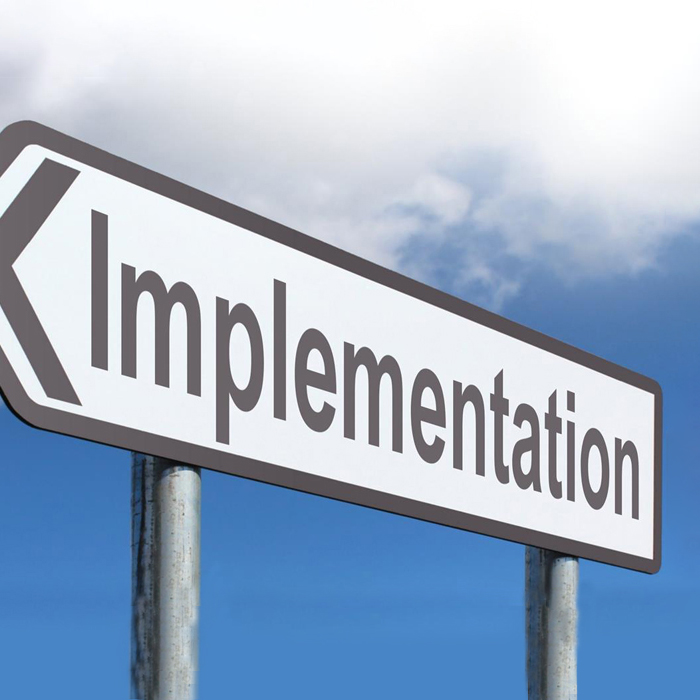Partnerships for Environmental Public Health (PEPH)

Using Implementation Science to Move Environmental Health Discoveries Into the Real-World
March 17, 2021
Interviewee: Lindsey Ann Martin, Ph.D.
In this podcast, we’ll hear from Lindsey Ann Martin, Ph.D., from the NIEHS Division of Extramural Research and Training, about the intersection of implementation science and environmental health research.
Using Implementation Science to Move Environmental Health Discoveries Into the Real-World
Scientists frequently make new discoveries that have the potential to improve health – but these breakthroughs don’t automatically or easily translate into real-world benefits. Research shows that it can take decades for health-related discoveries to be integrated into routine health care and public health practice.
Determining effective ways to close gaps between what scientists know and what people do is a goal of implementation science. Implementation science is defined as “the study of methods to promote the adoption and integration of evidence-based practices, interventions, and policies into routine health care and public health settings to improve our impact on population health.” Importantly, implementation researchers identify barriers to adoption of fact-based knowledge and develop strategies to overcome those barriers so that all people may benefit from an effective intervention.
This podcast explores how environmental health scientists can embrace implementation science to enhance the public health impact of their research and address environmental health disparities.
Interviewee: Lindsey Ann Martin, Ph.D.

Lindsey Ann Martin, Ph.D., is a Health Scientist Administrator in the NIEHS Division of Extramural Research and Training. Trained as a medical anthropologist, Martin oversees NIEHS-funded research focused on implementation and dissemination sciences, environmental health disparities, and community-based research approaches.
Martin joined NIEHS in January 2020 from the Center for Innovations in Quality, Effectiveness, and Safety at the Michael E. DeBakey Veterans Affairs (VA) Medical Center in Houston, Texas. There, she served as the lead qualitative methodologist in the Methodology and Analytics Core and was also a faculty advisor to the Veteran Community Engagement Committee. Lindsey also had an active role in the VA’s National Workgroup on Veteran Engagement.
Martin graduated with a doctorate and master’s degree in anthropology from Wayne State University (WSU). She also earned a graduate certificate in public health practice from the WSU School of Medicine and participated in the NIH Training Institute for Dissemination and Implementation Research in Health program in 2017.
Additional Resources
- Read a 2021 NIEHS Environmental Factor article about how implementation science can improve environmental health.
- Visit the National Cancer Institute’s (NCI) Training Institute for Dissemination and Implementation Research in Cancer for training resources.
- Learn more about implementation science through the& NCI’s Implementation Science Webinar series.
Relevant References
- Bauer MS, Kirchner J. 2020. Implementation science: What is it and why should I care? Psychiatry Res 283:112376. [Abstract Bauer MS, Kirchner J. 2020. Implementation science: What is it and why should I care? Psychiatry Res 283:112376.] [Full Text Bauer MS, Kirchner J. 2020. Implementation science: What is it and why should I care? Psychiatry Res 283:112376.]
- Bauer MS, Damschroder L, Hagedorn H, Smith J, Kilbourne AM. 2015. An introduction to implementation science for the non-specialist. BMC Psychol 3(1):32. [Abstract Bauer MS, Damschroder L, Hagedorn H, Smith J, Kilbourne AM. 2015. An introduction to implementation science for the non-specialist. BMC Psychol 3(1):32.] [Full Text Bauer MS, Damschroder L, Hagedorn H, Smith J, Kilbourne AM. 2015. An introduction to implementation science for the non-specialist. BMC Psychol 3(1):32.]
- Proctor EK, Powell BJ, Baumann AA, Hamilton AM, Santens RL. 2012. Writing implementation research grant proposals: ten key ingredients. Implement Sci 7:96. [Abstract Proctor EK, Powell BJ, Baumann AA, Hamilton AM, Santens RL. 2012. Writing implementation research grant proposals: ten key ingredients. Implement Sci 7:96.] [Full Text Proctor EK, Powell BJ, Baumann AA, Hamilton AM, Santens RL. 2012. Writing implementation research grant proposals: ten key ingredients. Implement Sci 7:96.]
Relevant Funding Opportunities
- Dissemination and Implementation Research in Health (R01 Clinical Trial Optional)
- Dissemination and Implementation Research in Health (R21 Clinical Trial Optional)
- Dissemination and Implementation Research in Health (R03 Clinical Trial Not Allowed)


